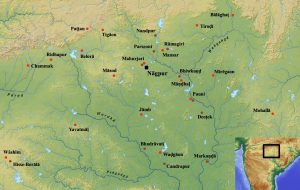
Ancient Vidarbha showing find-spots of Vākāṭaka inscriptions. (Zenodo).
| Metadata | |
|---|---|
| Object ID | OB00163 |
| Title | Washim Plates of Vindhyasakti II |
| Subtitle | |
| Inscription(s) | IN00176 |
| Child Object | |
| Parent Object | |
| Related Objects | OB00163a OB00163b OB00163c OB00163d |
| Responsibility | |
| Author | |
| Metadata recorded by | Dániel Balogh |
| Authority for metadata | |
| Metadata improved by | Dániel Balogh |
| Authoriy for improved | |
| Description | |
| Material | Metal / copper alloy |
| Object Type | Plate |
| Dimensions: | |
| Width | 15.5 |
| Height | 8.6 |
| Depth | |
| Weight | |
| Details | A set of four plates, the first and last inscribed only on the inner sides; the others on both faces. Their surface is flat, without raised rims. The hole (0.6 cm in diameter) for the connecting ring is on the left-hand side, vertically at the centre, and horizontally 3 centimetres from the edge. The connecting ring is extant (not included as a separate item here, since no description of it is available), but the seal is lost. The weight is reported in Mirashi 1963: 93 as 47.5 tolās (554 grams) for the plates and the ring together, but this figure is unlikely. For comparison, OB00161 (a single plate on which Mirashi specifically remarks that it is the thinnest Vākāṭaka plate known) weighs 227 grams. Since Mirashi edited the inscription from facsimiles, while the original editors Deshpande and Mahajan worked from photographs and report no weight, the figure must be either Mirashi's careless assumption or an erroneous report from an informant. In fact, the dimensions of the plates are also uncertain, as the original editors were only "given to understand that the photographs are equal to the size of the original plates" (Deshpande Mahajan 1939: 455). |
| History | |
| Created: | |
| Date | |
| Place | |
| Other ancient history | |
| Found: | |
| Date | |
| Place | Vāśim |
| Other modern history | |
| Latest: | |
| Date | 1963 |
| Place | |
| Authority | Mirashi, Vasudev Vishnu. (1963). Inscriptions of the Vākāṭakas (Corpus Inscriptionum Indicarum 5). Ootacamund: Archaeological Survey of India. |
| Details | Discovered by Vāsudev Śāstrī Dhanāgare, a paṇḍit in Vāśim (Washim, Basim; 20.099787, 77.148743); exact location and circumstances not reported. The plates apparently remained in the possession of the paṇḍit (and his heirs), or at least this is what Mirashi 1963: 93 says; however, the original editors (Deshpande Mahajan 1939: 455) say they had never actually handled the plates and they were not in the possession of this pandit, but "with a gentleman from the mofussil village near about Bāsim". |
| Notes | |